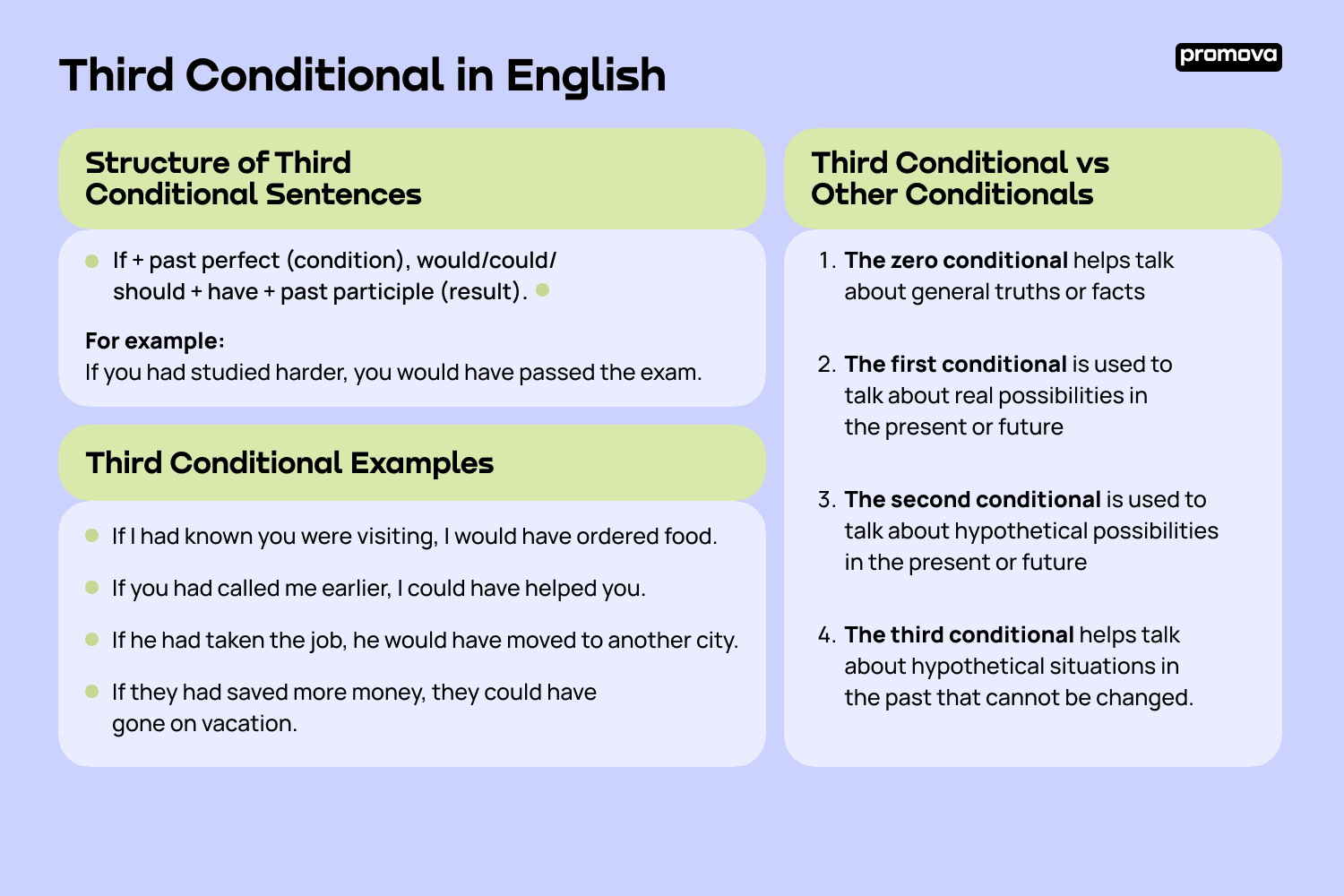Third Conditional in English
Contents
As you continue to learn English, you may come across different types of conditionals. The third conditional is one of them, and it’s a bit more complex than the first and second conditionals. In this reference, we’ll explore what conditionals are, what the third conditional means, the structure of third conditional sentences, and check out some handy examples.
What are Conditionals?
Conditionals are a type of sentence that express a hypothetical situation and its consequence. They are formed by combining an “if” clause (the condition) with a main clause (the result). There are four main types of conditionals: the zero, first, second, and third conditional.
What does the Third Conditional Mean?
The third conditional, also known as conditional type 3 or condition 3, is used to describe a hypothetical situation in the past that didn't happen, and its consequence. It’s used to talk about a situation that cannot be changed, and to speculate about what could have happened if things had been different.
Structure of Third Conditional Sentences
Third conditional sentences are structured as follows:
If + past perfect (condition), would/could/should + have + past participle (result).
Here’s an example:
If you had studied harder, you would have passed the exam.
In this example, the condition is “If you had studied harder” and the result is “you would have passed the exam”. The past perfect tense helps refer to a past action that was completed before another one in the past. The modal verb “would” is used to express the hypothetical consequence.
Third Conditional Examples
Examples of third conditional sentences:
- If I had known you were visiting, I would have ordered food.
- If you had called me earlier, I could have helped you.
- If he had taken the job, he would have moved to another city.
- If they had saved more money, they could have gone on vacation.
In each of these examples, the condition is in the past perfect tense, and the result is in the modal verb “would/could/should” and “have” + past participle form.
Third Conditional Rules
There are a few rules to keep in mind when using third conditional sentences:
- The condition must be in the past perfect tense.
- The result must use the modal verb “would/could/should” and “have” + past participle form.
- The third conditional helps talk about hypothetical situations in the past that cannot be changed.
- The third conditional is often used with regrets or to express a desire to change the past.
8
Third Conditional vs Other Conditionals
- The zero conditional helps talk about general truths or facts
- The first conditional is used to talk about real possibilities in the present or future
- The second conditional is used to talk about hypothetical possibilities in the present or future
- The third conditional helps talk about hypothetical situations in the past that cannot be changed.
So, the main difference between the third conditional and other conditionals is that it helps us talk about hypothetical situations in the past that cannot be changed. This can be useful for expressing regrets, or speculating about what could have happened if things had been different.
Common Mistakes
One common mistake when using third conditional sentences is to mix up the tenses. For example, using the past simple tense in the condition instead of the past perfect tense.
Another mistake is to use the wrong modal verb or forget to include “have” + past participle in the result. Pay attention to the tense and structure of the sentence to ensure it’s correct.

Summary
The third conditional is a type of conditional sentence that is used to talk about hypothetical situations in the past that cannot be changed. It’s formed with the past perfect tense in the condition and the modal verb “would/could/should” and “have” + past participle in the result. Pay attention to the structure and tense of the sentence to avoid common mistakes, and you'll quickly learn to get it right!



Comments